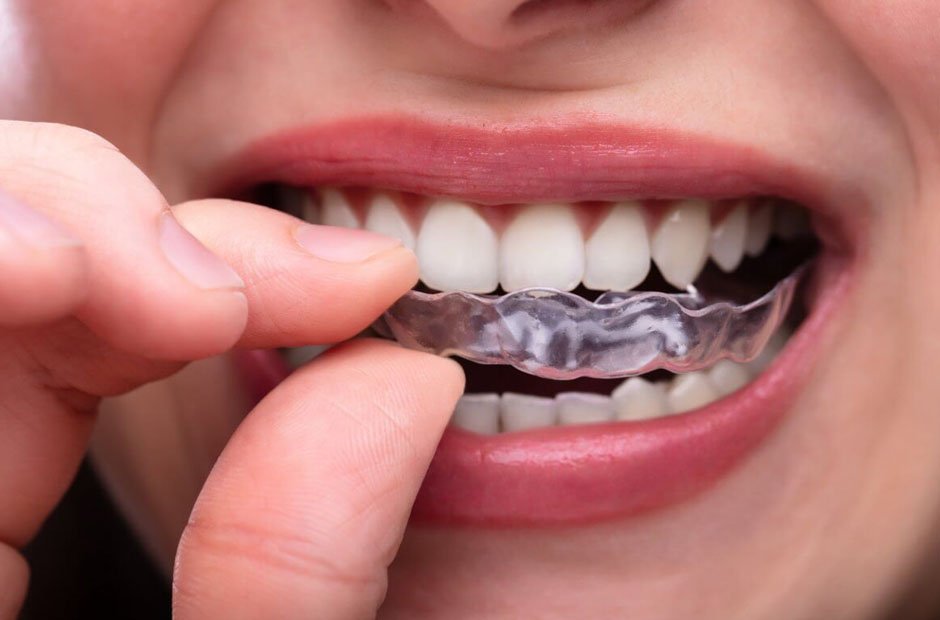Teeth grinding, also known as bruxism, is a common dental condition that affects many individuals. This involuntary clenching and grinding of the teeth can occur during the day or, more commonly, at night while asleep. While occasional teeth grinding may not cause significant harm, chronic bruxism can lead to various dental issues and discomfort. In this comprehensive guide, we will explore the signs and symptoms of teeth grinding, its potential causes, and effective treatment options to stop this habit.
Understanding Bruxism: What is Teeth Grinding?
Bruxism refers to the habit of clenching and grinding the teeth unconsciously. While occasional teeth grinding is normal and usually harmless, chronic bruxism can lead to detrimental effects on oral health. Many individuals are unaware that they grind their teeth, especially if it predominantly occurs during sleep. The force exerted during teeth grinding can be significant, ranging up to 250 pounds, which can result in various dental complications.
Recognizing the Signs and Symptoms of Teeth Grinding
Identifying the signs and symptoms of teeth grinding is crucial in managing and treating this condition. While some individuals may notice these signs themselves, others may require input from their sleeping partners or dental professionals. Here are the common signs that may indicate teeth grinding:
1. Morning Headaches
Awakening with a dull, throbbing headache can be a telltale sign of teeth grinding. These headaches often concentrate in the temple area and may subside within a short period after waking up.
2. Jaw Pain and Facial Discomfort
Individuals with bruxism may experience facial pain and discomfort, particularly in the jaw area. This can involve soreness, stiffness, or a clicking sound in the temporomandibular joint (TMJ) and jaw muscles.
3. Tooth Sensitivity
Teeth grinding can lead to increased tooth sensitivity, making them more susceptible to pain or discomfort when exposed to hot or cold stimuli.
4. Chipped, Cracked, or Worn-down Teeth
One of the most noticeable signs of bruxism is the damage it can cause to the teeth. Grinding can result in chipped, cracked, or flattened teeth, indicating excessive wear and potential exposure of deeper tooth layers.
5. Disrupted Sleep Patterns
Teeth grinding often leads to sleep disruptions for both the individual and their sleeping partner. The noise produced during teeth grinding may wake the person multiple times during the night, leading to fatigue and difficulty concentrating during the day.
6. Jaw Muscle Soreness and Fatigue
Individuals with bruxism may experience soreness and fatigue in the jaw muscles due to the constant clenching and grinding of teeth. This can manifest as jaw pain or discomfort throughout the day.
7. Earaches and Facial Pain
Teeth grinding can cause referred pain, including earaches and facial pain. Individuals may experience discomfort in the ear area and the front of the jaw, resembling a toothache.
8. Cheek and Lip Tissue Damage
In severe cases of teeth grinding, individuals may chew on the inner parts of their lips and cheeks while asleep. This can lead to soreness, tenderness, and the formation of sores that may take longer to heal.
A visit to your local dentist, such as a River North area Dental office if you live near River North, Chicago area, can confirm whether teeth grinding is the cause of these issues and help prevent further damage.
The Impact of Teeth Grinding on Oral Health
Teeth grinding can have detrimental effects on oral health if left untreated. The constant grinding and clenching exert excessive force on the teeth, jaw, and surrounding structures, leading to several complications. Here are the potential consequences of chronic bruxism:
1. Tooth Damage and Wear
The repetitive grinding motion can cause significant tooth damage over time. This includes chipping, cracking, and flattening of the teeth, which may require dental intervention to restore their structure and function.
2. TMJ Disorders
The excessive pressure exerted on the TMJ during teeth grinding can lead to temporomandibular joint disorders. This can result in jaw pain, limited jaw movement, clicking or popping sounds, and discomfort while chewing.
3. Gum Recession and Tooth Sensitivity
Teeth grinding can cause gum recession, exposing the tooth roots and increasing tooth sensitivity. This can result in discomfort or pain when consuming hot or cold foods and beverages.
4. Headaches and Facial Pain
The constant tension and strain on the jaw muscles from teeth grinding can lead to frequent headaches and facial pain. These symptoms can significantly impact an individual’s quality of life.
5. Sleep Disorders
Teeth grinding can disrupt sleep patterns, leading to disturbed sleep and fatigue. The noise produced during grinding can wake the individual or their sleeping partner, resulting in daytime sleepiness and reduced cognitive function.
6. Increased Risk of Dental Restorations
Individuals with bruxism have a higher risk of damaging dental restorations, such as fillings, crowns, and veneers. The excessive force and grinding motion can compromise the longevity and integrity of these restorations.
7. Jaw Muscle Hypertrophy
The constant clenching and grinding of teeth can lead to hypertrophy or enlargement of the jaw muscles. This can result in a square or bulky appearance of the jawline.
Effective Treatment Options for Teeth Grinding
Managing and treating teeth grinding involves a comprehensive approach to address the underlying causes, alleviate symptoms, and protect the teeth and jaw. Treatment options may vary depending on the severity and underlying factors contributing to bruxism. Here are some effective strategies to stop teeth grinding:
1. Night Guards or Splints
Night guards or splints are custom-made oral appliances prescribed by dentists to protect the teeth from grinding during sleep. These devices create a barrier between the upper and lower teeth, minimizing the impact of grinding and reducing tooth damage.
2. Stress Reduction Techniques
Stress and anxiety are common triggers for teeth grinding. Incorporating stress reduction techniques into daily routines, such as meditation, deep breathing exercises, or yoga, can help alleviate tension and reduce bruxism episodes.
3. Behavioral Therapy
Behavioral therapy, such as cognitive-behavioral therapy (CBT), can be beneficial for individuals with bruxism caused by stress or anxiety. CBT helps identify and modify negative thought patterns and behaviors that contribute to teeth grinding.
4. Muscle Relaxation Exercises
Performing jaw muscle relaxation exercises can help reduce muscle tension and alleviate jaw pain associated with teeth grinding. These exercises involve gentle stretching and massage techniques to relax the jaw muscles.
5. Medications
In severe cases where conservative measures are ineffective, medications may be prescribed to manage teeth grinding. Muscle relaxants, such as benzodiazepines or botulinum toxin injections, may be considered to reduce muscle activity and minimize grinding.
6. Dental Treatments
Dental treatments, such as orthodontic adjustments or dental reshaping, may be recommended to correct dental misalignment or malocclusion contributing to bruxism. These interventions aim to improve the alignment of the teeth and reduce grinding episodes.
7. Lifestyle Modifications
Certain lifestyle modifications can help reduce teeth grinding. Avoiding stimulating substances like caffeine and alcohol, practicing good sleep hygiene, and maintaining a balanced lifestyle can contribute to managing bruxism.
Preventing Teeth Grinding and Promoting Oral Health
While treatment options are available to manage teeth grinding, preventing the habit altogether is ideal for maintaining optimal oral health. Here are some preventive measures that can help reduce the risk of teeth grinding:
1. Stress Management
Implementing stress management techniques, such as regular exercise, relaxation exercises, and seeking support from mental health professionals, can help reduce stress-related bruxism.
2. Sleep Hygiene
Maintaining a consistent sleep schedule, creating a sleep-friendly environment, and practicing relaxation techniques before bedtime can contribute to better sleep quality and reduce the likelihood of teeth grinding.
3. Avoiding Stimulants
Limiting or avoiding substances known to contribute to teeth grinding, such as caffeine, alcohol, and recreational drugs, can help minimize bruxism episodes.
4. Dental Check-ups
Regular dental check-ups allow dentists to monitor the oral health of individuals prone to teeth grinding. Dentists can identify early signs of bruxism and provide appropriate interventions to prevent further damage.
5. Proper Oral Care
Maintaining good oral hygiene practices, including regular brushing, flossing, and using fluoride toothpaste, can help preserve the health of teeth and gums, reducing the risks associated with teeth grinding.
6. Implementing Relaxation Techniques
Incorporating relaxation techniques into daily routines, such as deep breathing exercises, meditation, or yoga, can help manage stress and reduce the likelihood of teeth grinding.
Conclusion
Teeth grinding, or bruxism, is a common dental condition that can have detrimental effects on oral health if left untreated. Recognizing the signs and symptoms of teeth grinding is crucial in seeking appropriate treatment. Effective strategies, including the use of night guards, stress reduction techniques, and muscle relaxation exercises, can help manage and alleviate the symptoms of bruxism. Preventive measures, such as stress management, maintaining good oral hygiene, and implementing relaxation techniques, can contribute to reducing the risk of teeth grinding and preserving oral health. Seeking professional advice from a dentist or healthcare provider is essential for an accurate diagnosis and tailored treatment plan to stop teeth grinding and promote overall well-being.
















